Abstract
We have identified an alcohol dehydrogenase activity in Pseudomonas putida strains carrying the CAM-OCT degradative plasmid that were grown on octane. The activity is nicotinamide adenine dinucleotide independent, sediments at 48,000 x g, and shows 20-fold greater activity with octanol rather than butanol as substrate. The enzyme is inducible by unoxidized alkane and is present only in strains that have the OCT plasmid genes for alkane degradation with a wild-type alcO locus. No analogous chromosomal dehydrogenase could be detected. Wild-type and actanol-negative mutants (alcA-) without plasmids both contain a constitutive nicotinamide adenine dinucleotide-linked soluble alcohol dehydrogenase activity. This means that alcA- mutants are cryptic for octanol oxidation and suggests that the particulate plasmid-coded alcohol dehydrogenase activity is active on surface- or membrane-bound substrate.
Full text
PDF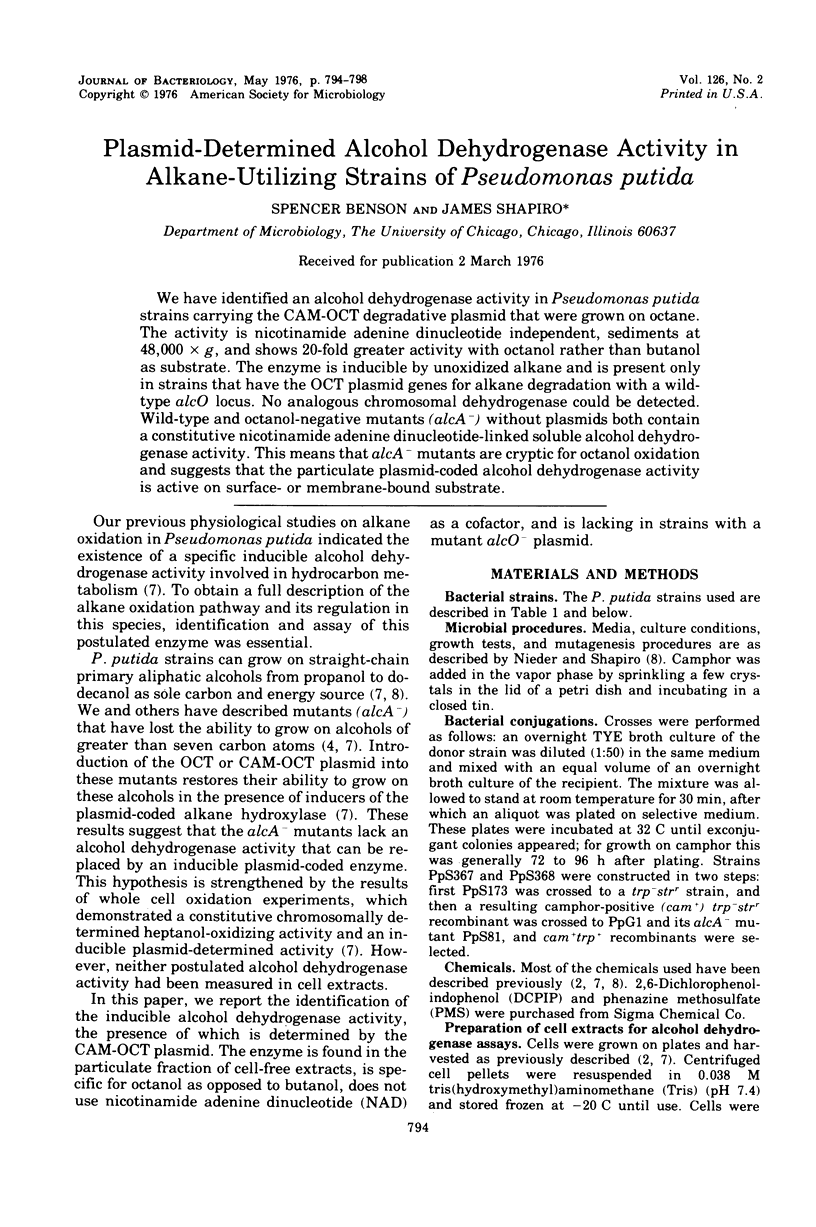
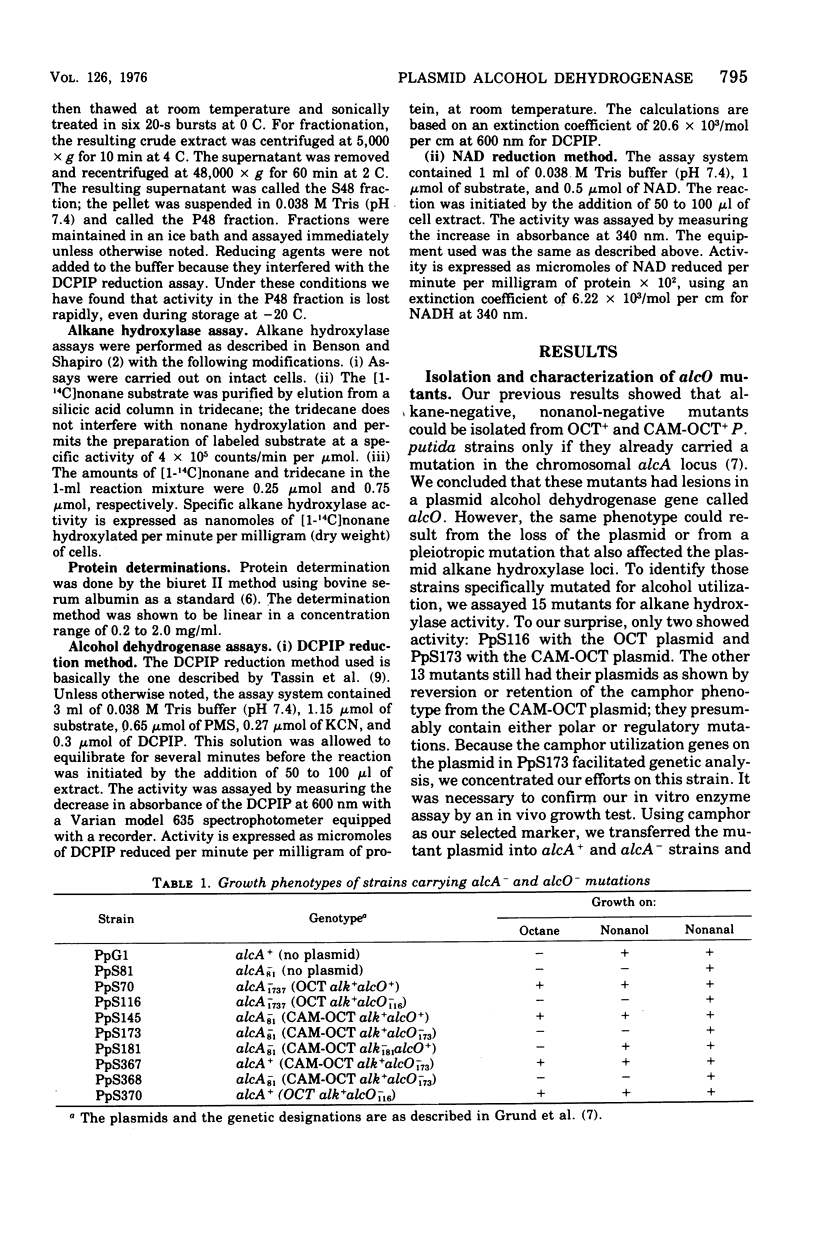
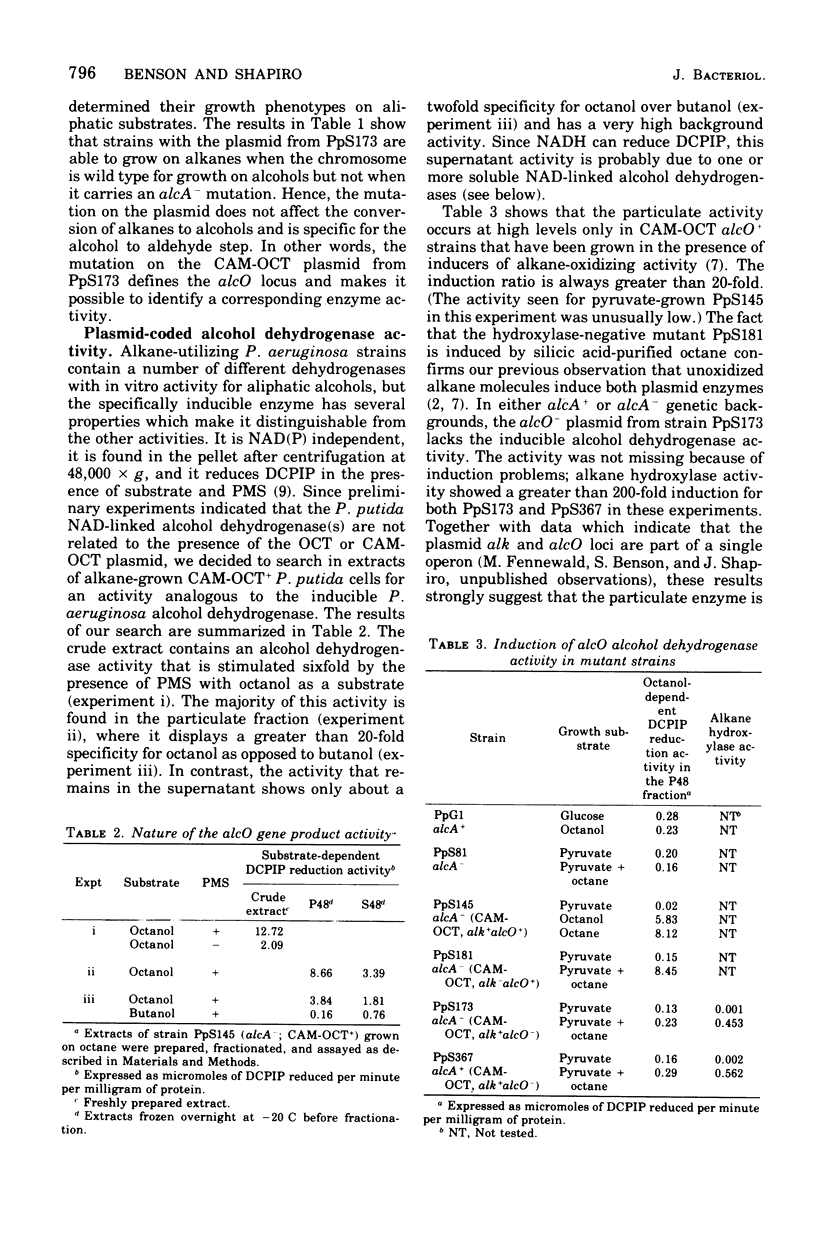
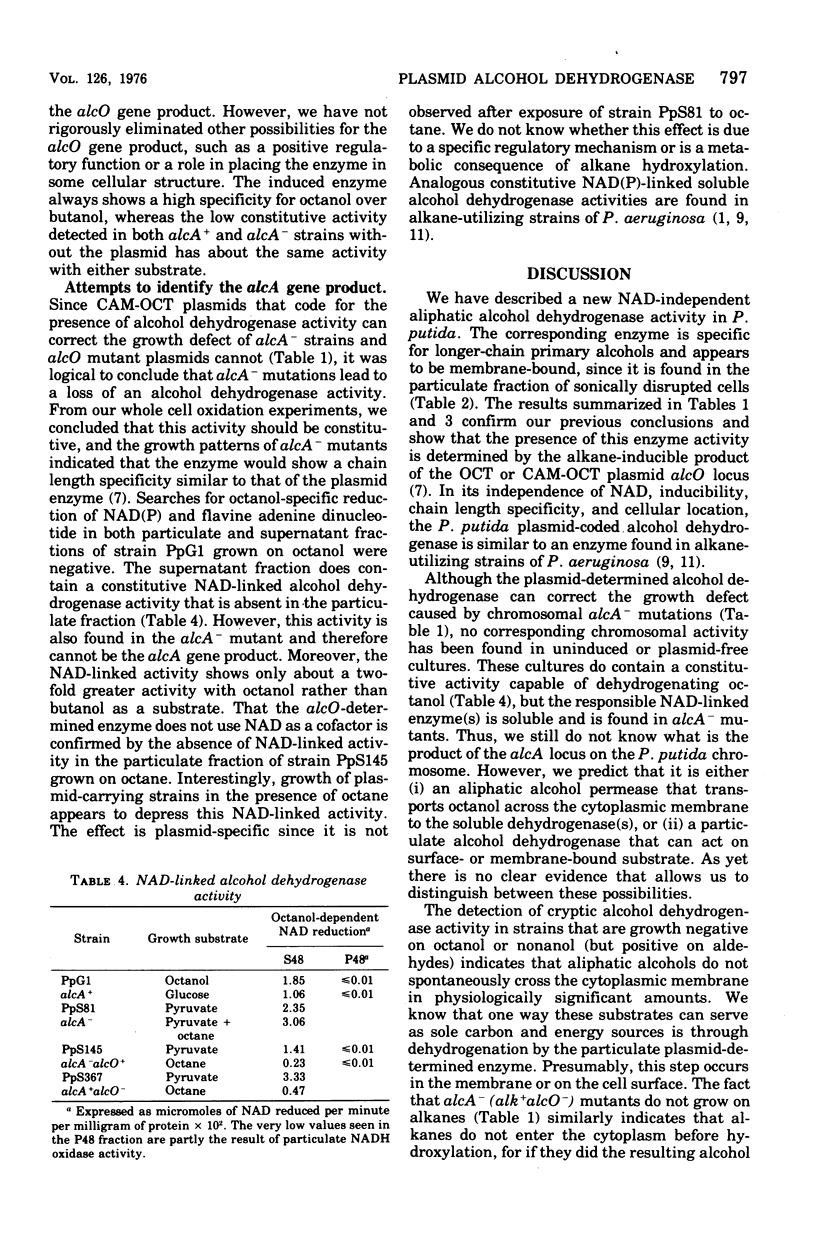
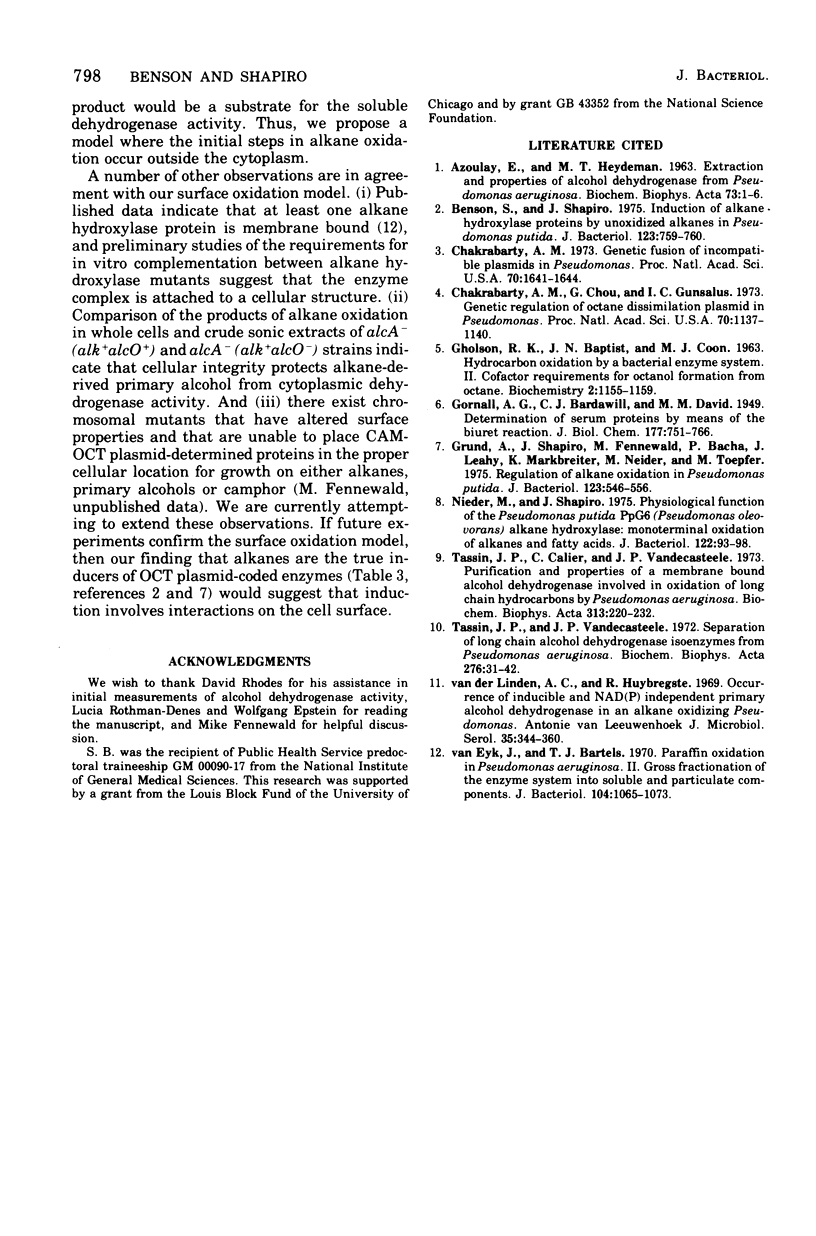
Selected References
These references are in PubMed. This may not be the complete list of references from this article.
- AZOULAY E., HEYDEMAN M. T. Extraction and properties of alcohol dehydrogenase from Pseudomonas aeruginosa. Biochim Biophys Acta. 1963 May 7;73:1–6. doi: 10.1016/0006-3002(63)90353-6. [DOI] [PubMed] [Google Scholar]
- Benson S., Shapiro J. Induction of alkane hydroxylase proteins by unoxidized alkane in Pseudomonas putida. J Bacteriol. 1975 Aug;123(2):759–760. doi: 10.1128/jb.123.2.759-760.1975. [DOI] [PMC free article] [PubMed] [Google Scholar]
- Chakrabarty A. M., Chou G., Gunsalus I. C. Genetic regulation of octane dissimilation plasmid in Pseudomonas. Proc Natl Acad Sci U S A. 1973 Apr;70(4):1137–1140. doi: 10.1073/pnas.70.4.1137. [DOI] [PMC free article] [PubMed] [Google Scholar]
- Chakrabarty A. M. Genetic fusion of incompatible plasmids in Pseudomonas. Proc Natl Acad Sci U S A. 1973 Jun;70(6):1641–1644. doi: 10.1073/pnas.70.6.1641. [DOI] [PMC free article] [PubMed] [Google Scholar]
- GHOLSON R. K., BAPTIST J. N., COON M. J. HYDROCARBON OXIDATION BY A BACTERIAL ENZYME SYSTEM. II. COFACTOR REQUIREMENTS FOR OCTANOL FORMATION FROM OCTANE. Biochemistry. 1963 Sep-Oct;2:1155–1159. doi: 10.1021/bi00905a043. [DOI] [PubMed] [Google Scholar]
- Grund A., Shapiro J., Fennewald M., Bacha P., Leahy J., Markbreiter K., Nieder M., Toepfer M. Regulation of alkane oxidation in Pseudomonas putida. J Bacteriol. 1975 Aug;123(2):546–556. doi: 10.1128/jb.123.2.546-556.1975. [DOI] [PMC free article] [PubMed] [Google Scholar]
- Nieder M., Shapiro J. Physiological function of the Pseudomonas putida PpG6 (Pseudomonas oleovorans) alkane hydroxylase: monoterminal oxidation of alkanes and fatty acids. J Bacteriol. 1975 Apr;122(1):93–98. doi: 10.1128/jb.122.1.93-98.1975. [DOI] [PMC free article] [PubMed] [Google Scholar]
- Tassin J. P., Vandecasteele J. P. Separation and characterization of long-chain alcohol dehydrogenase isoenzymes from Pseudomonas aeruginosa. Biochim Biophys Acta. 1972 Jul 13;276(1):31–42. doi: 10.1016/0005-2744(72)90005-8. [DOI] [PubMed] [Google Scholar]
- Van Eyk J., Bartels T. J. Paraffin Oxidation in Pseudomonas aeruginosa II. Gross Fractionation of the Enzyme System into Soluble and Particulate Components. J Bacteriol. 1970 Dec;104(3):1065–1073. doi: 10.1128/jb.104.3.1065-1073.1970. [DOI] [PMC free article] [PubMed] [Google Scholar]
- Van der Linden A. C., Huybregtse R. Occurrence of inducible and NAD(P)-independent primary alcohol dehydrogenases in an alkane-oxidizing Pseudomonas. Antonie Van Leeuwenhoek. 1969;35(3):344–360. doi: 10.1007/BF02219154. [DOI] [PubMed] [Google Scholar]


